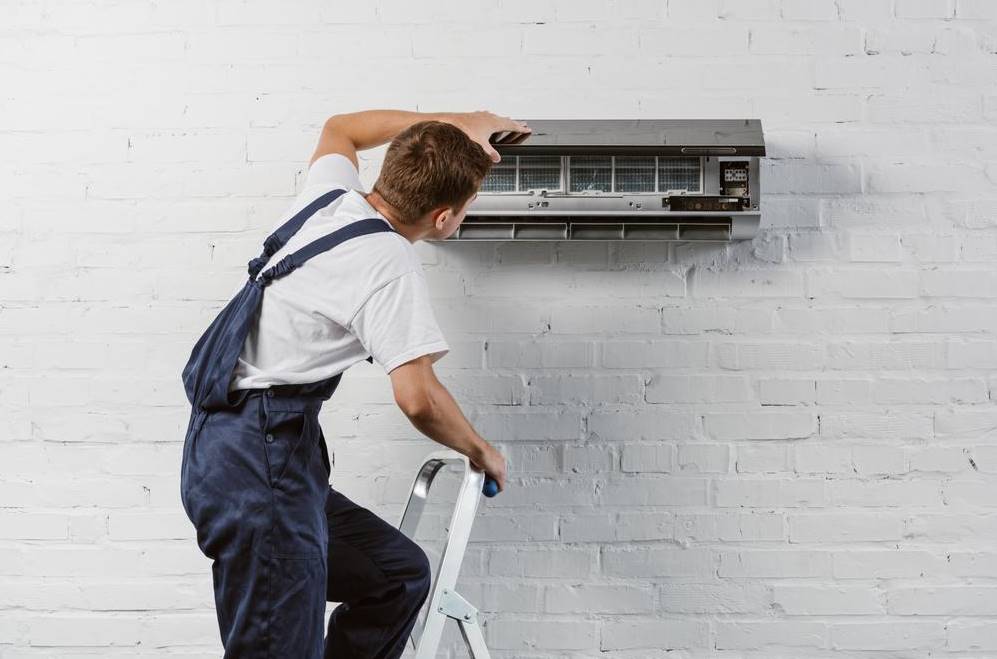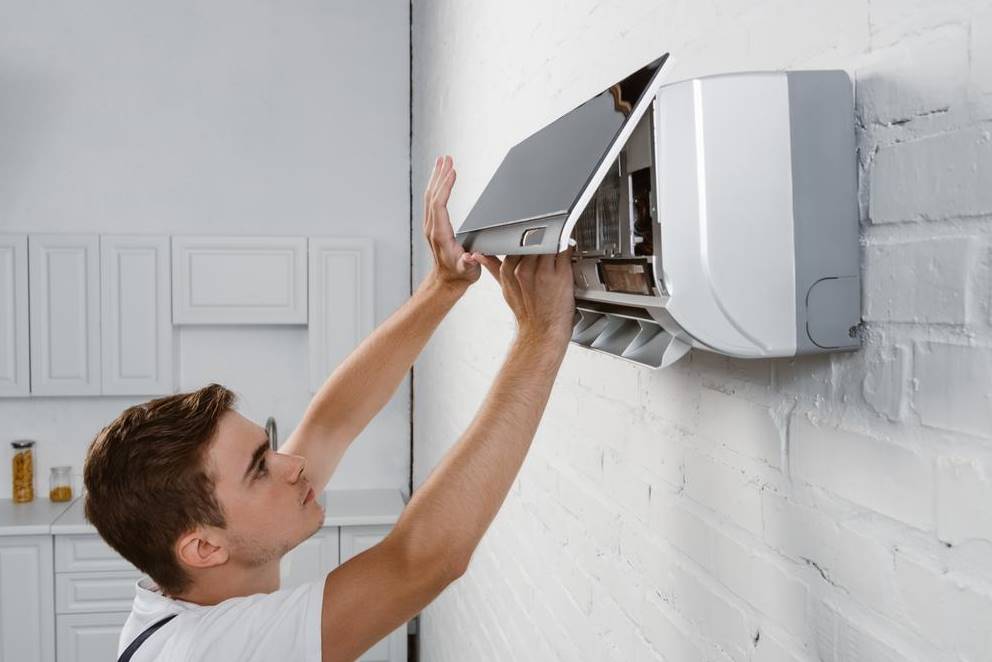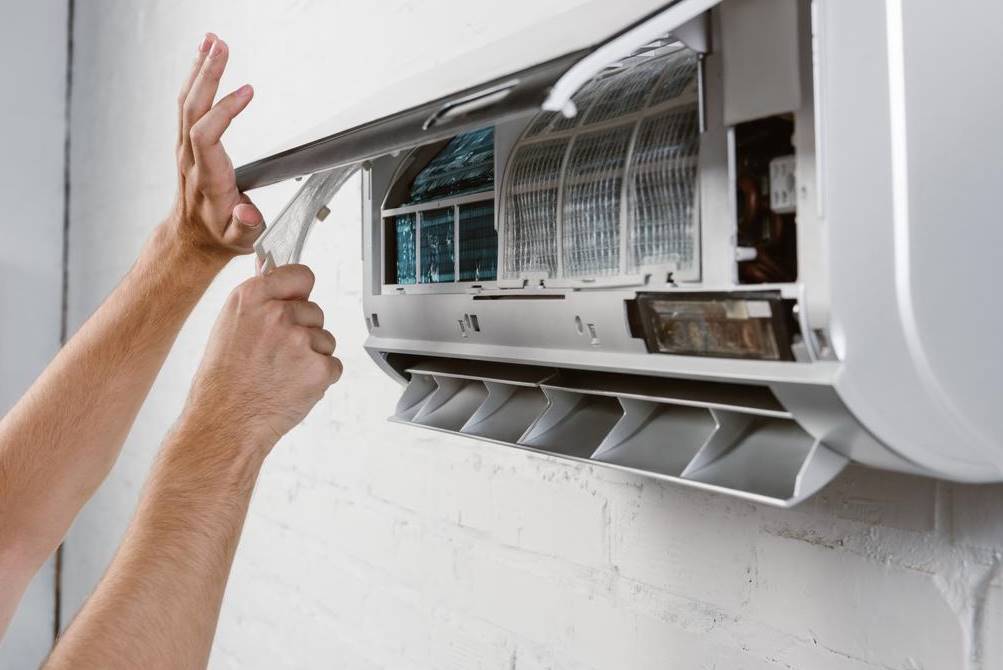Your HVAC system can function without an air filter, but you shouldn't. Dust and other debris can damage your air conditioner's components and lead to expensive repairs if you don't use a filter.
Filters in HVAC systems are essential to their continued efficiency and usefulness. Dust, debris, and other contaminants can enter the system if the air filter isn't working properly, causing it to malfunction and requiring expensive repairs. This article will explain why air filters are so crucial, how they function, and how often they should be serviced.
What Role Does an Air Filter Play?
An air conditioner's air filter is there to improve the quality of the air being cooled by the system. It aids in preventing and collecting allergens and irritants that can deteriorate indoor air quality, such as dust, pollen, mould spores, pet dander, and so on. The air filter serves as a barrier, stopping airborne contaminants at the source before they can enter the HVAC system and be dispersed throughout the building.
Most air filters have a cardboard housing and are made of materials like spun fibreglass, pleated paper, or cloth. Particles in the air are trapped by the filter as air is forced through it, and they cannot escape.
Common materials for an air filter include pleated paper or cloth, cardboard, and spun fibreglass. The primary purpose of an HVAC air filter is to improve the quality of the air in your home. Filters collect and store a wide variety of potentially harmful particles and contaminants, such as:
- Mold and mold spores
- Fibers and lint
- Dust and dirt
- Pollen
- Metal, plaster or wood particles
- Hair and animal fur
- Microorganisms and bacteria
Exhausted air is recycled through the HVAC system and filtered before being re-distributed. Particles and other airborne contaminants are captured by the filter as air is forced through it.
Minimum Efficiency Reporting Value (MERV) Ratings
The Minimum Efficiency Reporting Value (MERV) is a standard efficiency rating for air filters. Air filters with a higher MERV rating are prefered over those with a lower rating because of how well they trap various particle sizes.
For typical homes and offices, a MERV 8-10 high-efficiency particulate air filter is recommended. Below the threshold, smaller particles may be able to enter your unit, while above the threshold, airflow may be restricted. However, a MERV rating of 11-13 is recommended for extremely polluted environments.
Home air filters with a MERV rating of 17 or higher are considered to be among the most effective available. It is best to consult with an HVAC expert about the type of filter that is best for your space and area because higher MERV ratings may also mean higher energy consumption.
The minimum efficiency reporting value (MERV) is a common indicator of a filter's efficiency and performance. A filter's ability to remove particles from the air is indicated by its MERV rating, which can be anywhere from 1 to 16. More efficient filtration corresponds to a higher MERV rating.
- MERV 1-4: These inexpensive, standard filters are widely used and provide adequate filtration for most situations.
- MERV 6-8: As a result of their high filtration efficiency, these filters find widespread use in private homes. Pleated cloth or paper creates more surface area for collecting dust and dirt.
- MERV 9-12: These filters fall somewhere in the middle quality-wise, and yet they are capable of capturing particles as small as 1 micron.
- MERV 13-16: The best filters on the market are these high-efficiency ones. They are effective at filtering out particles as small as 0.3 microns.
Filters and filtration systems with MERV ratings above 16 are also commercially available. While highly efficient, filters of this type can restrict airflow within a home's heating, ventilation, and air conditioning system because of their thickness and density. Reduced heating and cooling efficiency as well as potential HVAC system damage are both possible results of using high-MERV filters. Before installing a filter with a higher MERV rating, check to see if your HVAC system can handle it.
The Benefit of Changing Your Air Filter Regularly
A properly functioning air conditioning system relies on regularly maintained air filters. I'll give you a few examples of why:
- Improved Indoor Air Quality. Air filters can significantly enhance the quality of air inside a building. Filters aid in cleaning the air by removing dust, pollen, and other allergens by capturing and trapping the particles. People with respiratory issues like asthma and allergies will benefit greatly from this. The importance of fresh, uncontaminated air indoors cannot be overstated.
- Prevention of Dust Buildup. The HVAC system can be protected from dust and debris by using air filters. Reduced effectiveness, increased energy consumption, and even system damage can result from dust accumulation. To keep dust from building up and maintain peak efficiency, the air filter should be cleaned or replaced on a regular basis.
- Protection of HVAC Equipment. Keeping the HVAC system's air filters clean is an additional means of defence. Blocking the system with dust and debris can cause it to overheat, cause the coils to freeze, and reduce airflow. These issues can lead to a shorter life expectancy and higher repair costs. Keeping your air filters clean can help your HVAC last longer and save you money.
- Energy Efficiency. Air conditioning and heating systems have to work harder to circulate air when filters are dirty or clogged. Since more work needs to be done, energy consumption rises, which can have an outsized effect on utility costs. You can reduce energy consumption and costs by maintaining your system with regular filter cleanings or replacements.
Choosing the Right Air Filter
Not all air filters are the same, so it's important to find one that works for your needs. The following are some things to think about when choosing an air filter:
- MERV Rating. The filtration efficiency of an air filter is measured in terms of its Minimum Efficiency Reporting Value (MERV) rating. Better filtration is indicated by a higher MERV rating, which can range from 1 to 16. A filter with a minimum efficiency reporting value (MERV) of 8 is recommended for most homes. However, filters with a higher MERV rating may reduce airflow and need to be replaced more frequently.
- Filter Type. There are many varieties of air filters available, such as fibreglass filters, pleated filters, and electrostatic filters. If you're looking for the cheapest and most basic option, fibreglass filters are your best bet. Pleated filters are superior to standard filters because of their larger surface area and ability to trap smaller particles. To attract and ensnare dust and other particles, electrostatic filters use an electric charge. They are highly effective, but their installation might need to be handled by a pro.
- Filter Size. Choosing the correct filter size is crucial for proper installation and optimal performance. Check the dimensions of your existing filter or consult the HVAC system's manufacturer to determine the appropriate size. Using the wrong size filter can lead to air leaks and reduced filtration efficiency.
How to Care for Your Air Filter?
If you want your air conditioner to perform at its best, here are some maintenance guidelines to keep in mind:
Filters Should Be Inspected And Replaced On A Regular Basis
Check your air filter at least once a month to assess its condition. If it appears dirty or clogged, it's time to replace it. As a general guideline, filters should be replaced every three months, but this can vary depending on factors such as the type of filter, environmental conditions, and the presence of pets or high occupancy in the household. Regularly replacing filters will help maintain optimal indoor air quality and system performance.
Observe All Safety Precautions
Refer to the manufacturer's recommendations for your specific HVAC system regarding filter maintenance. Follow their guidelines for proper installation, replacement frequency, and any specific instructions for cleaning or washing reusable filters. Adhering to these guidelines will ensure that your system operates efficiently and prolong its lifespan.
Consider Upgrading to High-Efficiency Filters
High-efficiency filters with a higher MERV rating may be worth the investment if you're worried about the quality of the air in your home. These filters have a higher filtration efficiency and can catch smaller particles. Higher-efficiency filters can be beneficial, but before installing them, you should check with an HVAC expert to make sure your system can handle the additional airflow resistance.
Schedule Professional Maintenance
If you want your HVAC system to last as long as possible and perform at peak efficiency, regular professional maintenance is a must. Technicians can check the air filter and other parts of the heating, ventilation, and air conditioning system during regular maintenance visits and make any necessary repairs. Expert servicing can spot problems early on, saving you time and money in the long run.
How Often Should I Change My Air Filters?
Every month, you should inspect the HVAC filter to see if it needs to be changed. You should anticipate having to swap it out every three months at the very least. There is no one-size-fits-all response to this question because it is contingent on the specifics of your air conditioner's filter needs. The season and the conditions inside your home are also important considerations. So, it makes sense that living in a dusty environment like the desert would necessitate a higher-quality air filter and more frequent filter changes.
How many people live in your home, and do you have any pets? If either of these describes your home, it might be time to increase the frequency of your air filter changes. Generally speaking, checking the air filter on your own is the most reliable way to tell if it needs to be replaced. When the filter becomes saturated with dust and pollen grains, it is time to replace it.
Conclusion
Air filters are essential for the efficiency and usefulness of an air conditioner, as they prevent and collect allergens and irritants that can deteriorate indoor air quality. They serve as a barrier, stopping airborne contaminants from entering the system and requiring costly repairs. Common materials for air filters include cardboard housing, spun fiberglass, pleated paper, or cloth.
The Minimum Efficiency Reporting Value (MERV) is a standard efficiency rating for air filters, with higher ratings being preferred for better trapping efficiency. For typical homes and offices, a MERV 8-10 high-efficiency particulate air filter is recommended, while 11-13 is recommended for extremely polluted environments. Home air filters with a MERV rating of 17 or higher are considered among the most effective available.
Changing your air filter regularly is crucial for improving indoor air quality, preventing dust buildup, protecting HVAC equipment, and enhancing energy efficiency. Regular cleanings or replacements can help maintain peak efficiency, prevent dust accumulation, and protect HVAC equipment from overheating, freezing, and reduced airflow. Additionally, regular filter cleanings or replacements can reduce energy consumption and costs, as air conditioning and heating systems work harder to circulate air when filters are dirty or clogged.
In conclusion, air filters are vital for maintaining a properly functioning air conditioning system, as they play a crucial role in preventing and collecting harmful particles and contaminants. Regular maintenance can lead to improved indoor air quality, reduced energy consumption, and overall cost savings.
When choosing an air filter, consider factors such as the MERV rating, filter type, and filter size. A filter with a MERV rating of 8 is recommended for most homes, but higher MERV ratings may reduce airflow and require more frequent replacements. Filters can be fibreglass, pleated, or electrostatic, with fibreglass being the cheapest and pleated being superior. Filter size is crucial for proper installation and performance.
Maintaining your air filter is essential for optimal indoor air quality and system performance. Regular inspections and replacements are recommended, with a general recommendation of every three months. Safety precautions should be followed, and upgrading to high-efficiency filters with a higher MERV rating may be beneficial. Regular professional maintenance is essential for the longevity and performance of your HVAC system.
Changing your air filter every month is recommended, with a three-month interval. Seasonal and indoor conditions also play a role. Living in dusty environments or with pets may require more frequent filter changes. Regular checks on the air filter are the most reliable way to determine if it needs replacement.
Content Summary:
- Your HVAC system can function without an air filter, but you shouldn't.
- Dust and other debris can damage your air conditioner's components and lead to expensive repairs if you don't use a filter.
- Filters in HVAC systems are essential to their continued efficiency and usefulness.
- Dust, debris, and other contaminants can enter the system if the air filter isn't working properly, causing it to malfunction and requiring expensive repairs.
- This article will explain why air filters are so crucial, how they function, and how often they should be serviced.
- An air conditioner's air filter is there to improve the quality of the air being cooled by the system.
- The air filter serves as a barrier, stopping airborne contaminants at the source before they can enter the HVAC system and be dispersed throughout the building.
- Common materials for an air filter include pleated paper or cloth, cardboard, and spun fibreglass.
- The primary purpose of an HVAC air filter is to improve the quality of the air in your home.
- Particles and other airborne contaminants are captured by the filter as air is forced through it.
- The Minimum Efficiency Reporting Value (MERV) is a standard efficiency rating for air filters.
- For typical homes and offices, a MERV 8-10 high-efficiency particulate air filter is recommended.
- However, a MERV rating of 11-13 is recommended for extremely polluted environments.
- Home air filters with a MERV rating of 17 or higher are considered to be among the most effective available.
- It is best to consult with an HVAC expert about the type of filter that is best for your space and area because higher MERV ratings may also mean higher energy consumption.
- The minimum efficiency reporting value (MERV) is a common indicator of a filter's efficiency and performance.
- A filter's ability to remove particles from the air is indicated by its MERV rating, which can be anywhere from 1 to 16.
- More efficient filtration corresponds to a higher MERV rating.
- MERV 13-16: The best filters on the market are these high-efficiency ones.
- They are effective at filtering out particles as small as 0.3 microns.
- Filters and filtration systems with MERV ratings above 16 are also commercially available.
- While highly efficient, filters of this type can restrict airflow within a home's heating, ventilation, and air conditioning system because of their thickness and density.
- Reduced heating and cooling efficiency as well as potential HVAC system damage are both possible results of using high-MERV filters.
- Before installing a filter with a higher MERV rating, check to see if your HVAC system can handle it.
- A properly functioning air conditioning system relies on regularly maintained air filters.
- Air filters can significantly enhance the quality of air inside a building.
- The HVAC system can be protected from dust and debris by using air filters.
- To keep dust from building up and maintain peak efficiency, the air filter should be cleaned or replaced on a regular basis.
- Keeping the HVAC system's air filters clean is an additional means of defence.
- Keeping your air filters clean can help your HVAC last longer and save you money.
- You can reduce energy consumption and costs by maintaining your system with regular filter cleanings or replacements.
- Not all air filters are the same, so it's important to find one that works for your needs.
- The following are some things to think about when choosing an air filter: 1.
- The filtration efficiency of an air filter is measured in terms of its Minimum Efficiency Reporting Value (MERV) rating.
- A filter with a minimum efficiency reporting value (MERV) of 8 is recommended for most homes.
Frequently Asked Questions About Air Condition
The primary purpose of an air filter in an air conditioning system is to capture and remove airborne particles, such as dust, pollen, pet dander, and allergens, from the indoor air. This helps improve indoor air quality and protects the system's components from debris.
The quality of the air filter plays a significant role in the performance of the air conditioning system. High-quality filters, such as HEPA filters, are more effective at trapping particles, leading to cleaner air. However, denser filters may reduce airflow, affecting the system's efficiency. It's essential to choose a filter that balances filtration efficiency with proper airflow.
The frequency of air filter replacement or cleaning depends on several factors, including the type of filter, the level of indoor air pollution, and the system's usage. In general, it's recommended to check the filter monthly and replace it every 3 to 6 months, or more frequently if it becomes visibly dirty or clogged.
Yes, a dirty or clogged air filter can significantly impact the energy efficiency of the air conditioning system. When the filter is obstructed, it restricts airflow, causing the system to work harder to cool or heat your space. This increased workload leads to higher energy consumption and potentially higher utility bills.
Yes, there are various types of air filters, including fiberglass, pleated, electrostatic, and HEPA filters, each with different filtration capabilities. To choose the right one, consider your specific indoor air quality needs, system compatibility, and the MERV (Minimum Efficiency Reporting Value) rating. Higher MERV ratings indicate better filtration but may reduce airflow, so it's important to strike a balance based on your priorities.



